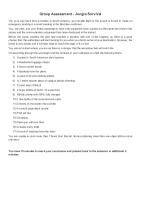Revolution in Egypt Case Study [PDF]
Revolution in Egypt Case Study 1. What were the underlying causes, economic and political, of the collapse of the Mubar
37 3 110KB
Papiere empfehlen
![Revolution in Egypt Case Study [PDF]](https://vdoc.tips/img/200x200/revolution-in-egypt-case-study.jpg)
- Author / Uploaded
- John Pickle
Datei wird geladen, bitte warten...
Zitiervorschau
Revolution in Egypt Case Study
1. What were the underlying causes, economic and political, of the collapse of the Mubarak regime? 1. Inflation was at a high rate of 12.8% and superficial reforms are falling apart. A global economic crisis decreased tourism ( accounted for 8.5% of GDP), and there was a huge socioeconomic gap between the rich and the poor. Around 2.8 million people could not afford their basic food necessities. Foreign governments were pressuring Mubarak to step down and to transition to a democratic election because of the corruption in the government.
2. What do you think the Egyptian government needs to do in order to get the economy growing again and to attract foreign capital? What are the risks to the government of taking such actions? 1. The government needs to take a more democratic approach to reforms and policies. There could also be investments in infrastructure to create more jobs and a safer environment. Political stability can positively affect the economy. Investors would increase their business in Egypt and tourism would also increase. The government could face retaliation from the former way of a corrupted government and it may take time to implement a cash-flow economy.
3. What dangers do you see in the current trajectory of the Egyptian economy? What are the implications of these dangers for foreign companies that might consider doing business in Egypt? What do you think it would take to encourage more foreigners to visit, invest, and do business in Egypt? Would such inward investment be good for the Egyptian economy? 1. Since Egypt is straying away from democratic leadership, investors and companies may not be willing to risk an investment where there is no democratic leadership and the government owns many of he companies and businesses. The current state of the economy could be changed and create jobs for citizens. If the government turns to democracy, investors will be more satisfied with the economic and political forces.
2. The biggest thing Egypt needs to do is get a stable economy and a democratic government. Potential investors may not be promoted to invest in a country that has a corrupted government or if there are high amounts of violence occurring. An inward investment into the stability of the economy would be good because companies would look for investment opportunities and tourism would increase. More jobs would be made and people would have more money to spend.
4. Political risks in Egypt seem to be increasing again, and the country seems to be retreating from democracy, largely due to intervention by the military. As a manager in an international business, how would the current turmoil and political uncertainty in Egypt influence your investment decisions, and what does this mean for the future of the Egyptian economy? 1. Political risk in Egypt seems to be high as the current economic state doesn’t seem to be too attractive to investors. Not having new investors, and if current investors pull out, Egypt’s economy will face additional problems.









